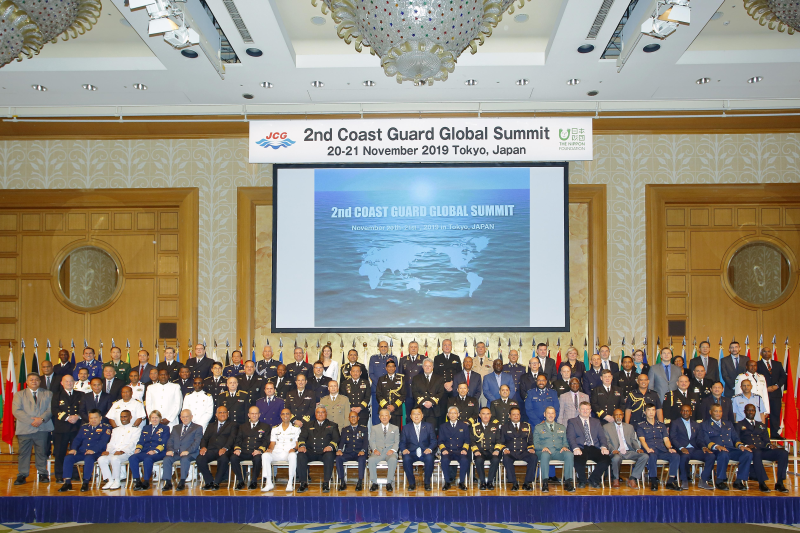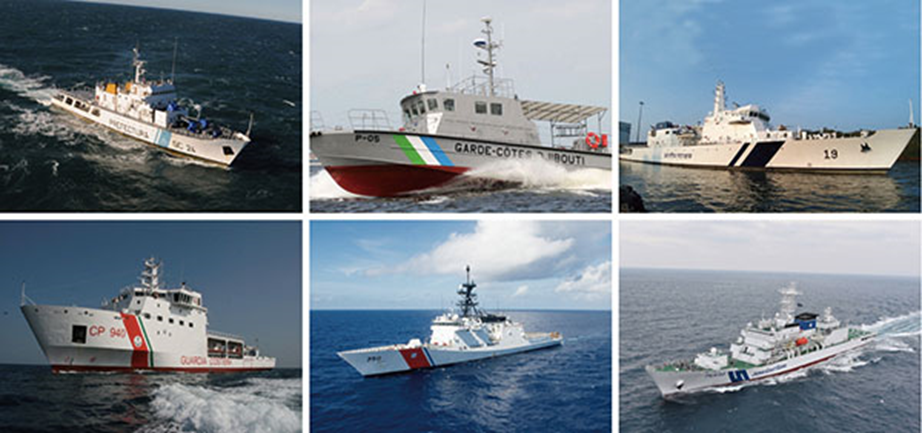Ocean Newsletter
No.507 September 20, 2021
-
The Growth of Coast Guard Agencies Worldwide and the Current Situation on Their Cooperation
IWANAMI Shuichi
Former Commandant, Japan Coast Guard
/ Selected Papers No.27(p.24)
In recent years, there has been an expansion and universalization of Coast Guard agencies against the background of expanding sea areas under the jurisdiction of coastal states and various changes occurring in the marine environment. The circumstances leading to each Coast Guard agency’s establishment and organizational structure are diverse, but standardization can also be seen, for example, in the naming of agencies. As border-straddling threats and fears of large-scale disasters at sea increase, a new level of cooperation and coordination among Coast Guard agencies is hoped for.
Selected Papers No.27(p.24) -
The Coexistence of Housework and Diplomacy in the Fishing Industries of the Pacific Island Countries
YAMASHITA Haruko
Professor, Graduate School of Economics, Daito Bunka UniversityThe Pacific Island countries, which possess vast EEZs, have limited land areas and fragile economic infrastructures. As a result, there is a high level of dependency on the fishing industry as both a food source for the people and a platform for diplomacy. The allocation of fishing quotas for offshore tuna fisheries is used as a diplomatic bargaining chip to augment government revenue. Now that policies are prioritizing job creation and societal stability, however, offshore fishing is becoming a domestic industry. Coastal fishing is looked on as a household task, and resources are monitored under the traditional system for fishing rights. -
Treatment of Castaways and Water’s Edge Border Control Strategies for Epidemics on Uninhabited Islands in the Edo Period
HASHIMURA Osamu
Professor, Division of Humanities and Social Science, Tokyo Gakugei UniversityI would like here to introduce water’s edge border control strategies for epidemics in the coastal areas of western Kyushu in the Edo Period, as well as how foreign castaways received different treatment based on their origins; also, how the sick were quarantined on uninhabited islands (the Goto Islands in Nagasaki and Amakusa in Kumamoto). I would also like to examine issues regarding differences in treatment given to people who died from illness and how uninhabited islands are used today.
The Growth of Coast Guard Agencies Worldwide and the Current Situation on Their Cooperation
In recent years, there has been an expansion and universalization of Coast Guard agencies against the background of expanding sea areas under the jurisdiction of coastal states and various changes occurring in the marine environment. The circumstances leading to each Coast Guard agency’s establishment and organizational structure are diverse, but standardization can also be seen, for example, in the naming of agencies. As border-straddling threats and fears of large-scale disasters at sea increase, a new level of cooperation and coordination among Coast Guard agencies is hoped for.
Background to the Expansion of Coast Guard Agencies
The oceans are not only a border for coastal countries; they are also a transportation route for the majority of international logistics, a treasure trove of marine resources such as fish, energy, and minerals, and a place for various activities, including leisure activities. Therefore, ensuring maritime safety and security and preserving marine environments is fundamental to the peace, stability, and development of coastal countries, regions and the international community. In the past, these duties were often performed by various pre-existing agencies in each country, such as navies, border guard agencies, and police agencies. However, there has been a rapid increase in the number of countries that have established coast guard agencies in recent years. These agencies carry out maritime operations such as maritime safety/security and environmental protection in either a comprehensive manner or a dedicated manner in specific areas. It has also become more common that these operations are referred to as coast guard functions.
The following factors may have led coast guard agencies to expand and become more universal in recent years:
- (1) The expansion of coastal states' jurisdiction over a wider area of the sea under the United Nations Convention on the Law of the Sea.
- (2) An increase in maritime activities due to the expansion of economic activities and globalization.
- (3) Expansions in maritime safety and security issues such as maritime terrorism, piracy, and large-scale accidents.
- (4) Frequent disputes and conflicts among nations over maritime domains and interests.
In fact, the establishment of coast guard agencies has become more noticeable since the 1970s when considerations surrounding the United Nations Convention on the Law of the Sea commenced. This trend towards establishing coast guards has accelerated since the 2000s when the maritime safety and security situation changed significantly. These changes included terrorist attacks in the United States, increased maritime crimes such as piracy, drug smuggling, and poaching, a rapid increase in the number of refugees at sea, and the occurrence of large-scale disasters at sea. Continuing this trend, since 2010, new or reorganized coast guard agencies have been established in the Union of Comoros, Djibouti, Sri Lanka, China, Indonesia, Kenya, and other countries. Existing coast guard agencies are also being strengthened in their respective countries. In 2016, the European Union (EU), which is facing migration and refugee issues, strengthened and expanded the authority of the European Agency for the Management of Operational Cooperation at the External Borders of the Member States of the European Union (FRONTEX), reorganizing it into the European Border and Coast Guard Agency. In January 2021, the European Border and Coast Guard standing corps was established as the EU's first operational force.
Diversity and Standardization of Coast Guard Agencies
Compared to navies, the history of coast guard systems is relatively short, and their development and organizational forms vary from country to country. In November 2019, the Japan Coast Guard and the Nippon Foundation co-hosted the second Coast Guard Global Summit (CGGS) in Tokyo. The event was attended by 84 organizations from 75 countries with coast guard duties. Alongside independent organizations dedicated to coast guard duties, there were various types of organizations, including military, border guard, security, and police agencies that are either dedicated to coast guard duties, have agencies under their umbrella dedicated to coast guard duties or are agencies that coordinate the coast guard duties of domestic agencies (see references below). Some coast guard agencies that fall under military organizations have military functions as well.
 Group photo of the Second Coast Guard Global Summit
Group photo of the Second Coast Guard Global Summit
The way these agencies were formed is as diverse as their organizational structures. Some were newly established coast guard agencies; others were existing organizations reorganized into coast guard agencies, while others were part of pre-existing organizations for which dedicated coast guard duties were assigned. Yet others were coordinating agencies, which were reorganized into actual coast guard agencies. Globally, it appears as though coast guard systems are still changing.
However, standardization of names and hull markings for coast guard agencies is progressing. Increasingly, agencies dedicated to coast guard operations, whether independent or under the umbrella of another major agency, are using the English title of "Coast Guard" to refer to themselves. Additionally, many vessels owned by coast guard agencies of various countries have diagonal paint (racing stripes) on the front of their hulls. These external standards are not prescribed by international regulations but have naturally taken root as coast guard agencies become universalized. In addition to external standards, there has been a gradual standardization of maritime law enforcement methods such as warning and stopping measures.
 Top row, from left: Argentine Coast Guard, Djibouti Coast Guard (Source: JICA's ODA Visualization Website), Indian Coast Guard,
Top row, from left: Argentine Coast Guard, Djibouti Coast Guard (Source: JICA's ODA Visualization Website), Indian Coast Guard,
Italian Coast Guard, U.S. Coast Guard, Japan Coast Guard
Cooperation among Coast Guard Agencies and Future Challenges
As a result of these expansions, cooperation amongst agencies has been developing at a regional level. Japan has been leading the way in multilateral cooperation among coast guard agencies. The Japan Coast Guard and the Nippon Foundation have cooperated to hold the North Pacific Coast Guard Forum (NPCGF) since 2000, the Head of Asia Coast Guard Forum (HACGAM) since 2004 (successor to the Regional Conference on Combating Piracy and Armed Robbery against Ships held in 2000), and the Coast Guard Global Summit* since 2017. In response, multilateral meetings by coast guard agencies are now being held in various regions, such as the "Black Sea Littoral States Border/Coast Guard Agencies Cooperation Forum (BSCF)," the "North Atlantic Coast Guard Forum (NACGF)," the "European Coast Guard Functions Forum (ECGFF)," the "Mediterranean Coast Guard Functions Forum (MCGFF)," and the "Arctic Coast Guard Forum (ACGF)." There has been an increase in various transnational threats at sea, such as the expansion of international organized crime, piracy, terrorism, and other crimes, influxes of refugees, and illegal fishing operations, as well as the recent increase in maritime activities and concerns about large-scale disasters at sea due to environmental changes such as climate change. Thus, it is becoming increasingly important to strengthen cooperation and dialogue among the world's coast guard agencies, transcending regional frameworks to address these worldwide challenges. Coordination and cooperation among coast guard agencies that conduct maritime law enforcement activities under national and international laws, not only in territorial waters but also on the high seas, will act as a foundation for regional and global peace and stability based on the rule of law at sea. Having said that, cooperation among coast guard agencies has just started and is still a new concept. Many issues need to be addressed in the future, such as methods of information sharing, capacity-building support for newly established coast guard agencies, and human resource development for coast guard operations. While addressing these issues, it is hoped that coordination and cooperation among coast guard agencies will be further developed at both the regional level and a worldwide level through the Coast Guard Global Summit. (End)
- *See "Hosting of the Coast Guard Global Summit (CGGS)—Towards the Maintenance of International Maritime Order—" by Kentaro Furuya, in Ocean Newsletter No. 416.
- Reference: "Research on the Current State of the Coast Guard Agencies of the World," Japan Coast Guard Foundation (March 2021) URL: https://www.jcga.or.jp/pdf/wcgr.pdf
